Norman MacCaig: An Interview
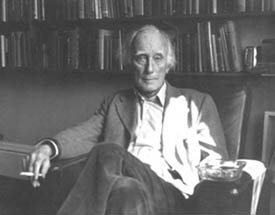 I was going to start by asking you what you mean by calling yourself a Zen Calvinist, but I realised that if you were really a Zen Calvinist, you couldn’t possibly answer that question. So I’m going to start by asking you, can poetry be taught?
I was going to start by asking you what you mean by calling yourself a Zen Calvinist, but I realised that if you were really a Zen Calvinist, you couldn’t possibly answer that question. So I’m going to start by asking you, can poetry be taught?
Well, I’ll answer the first one first. I was on a panel and I was asked what my religion was and I said ‘Zen Calvinist,’ just to shut them up. And the second question, can poetry be taught? I didn’t think so. When I was asked to be Writer in Residence at Edinburgh I thought, you can’t teach poetry. This is ridiculous. I’d always been suspicious of ‘Creative Classes.’ However, I learned something. I thought that if the young person, the student, has poetry in him or her, to offer them help is like offering a propeller to a bird. And if they haven’t got poetry in them, there’s nothing you can do that will produce it. I used to quote a fascinating couplet: ‘The feathered tribes on pinions skim the air, / Not so the mackerel and still less the bear.’ But I found that when the students brought me things, I never taught them in the sense of, ‘You should do this, you should do that.’ The thing was to discover what they wanted to write about and the form that they wanted to write it in, and go through each poem with a toothcomb in an attempt to show them how they could improve the poem. A very common thing was to find a line I just couldn’t understand, and I’d say, ‘I don’t understand that line. It’s very boring to ask, I know, but what does it mean?’ Extraordinarily often they’d say, ‘Well as a matter of fact I don’t know.’ And I’d say, ‘What’s it doing there then?’ And they would say, ‘I liked the image.’ I’d say, ‘So do I. But I don’t know what it means. It’s a nice line. Remove it. Make it the start of a new poem.’ And I found that talking like that was a big help to them. Two things happened. One was, because they had a sympathetic guy to talk to, they started writing more. The other thing was, since they knew I was going to go through it, niggling away, they wrote far more self-critically, and they improved to an extraordinary degree. I would think I saved them a few years in reaching the stage they did.
Quite a few of those students have had books out since. Valerie Gillies for one, and a fellow who’s now in England, and Alistair McLean, who wrote a good first book of poems. The second one I didn’t like so much. The first one was called From the Wilderness. It’s not much talked about now, more’s the pity, but it made quite a stir when it came out. And there were others. So you can’t teach poetry, but you can see what the writer is up to and point to the faults.
Is there anything you think about that you haven’t been able to express on paper?
That I think about or feel about?
Think… feel… something of you. Something that you are.
I don’t know. I don’t think of myself all the time. I’m just a fellow…
But you are yourself all the time.
So I don’t need to think about it.
OK. Something you feel about.
In some ways I’m a reticent man, and for quite a number of years there wasn’t very much of my real true deep feelings in my writing. A terrible thing about getting oldish is that your friends start dying, and in the last ten years I have lost seven or eight of my closest. And I have found as a result of this, quite unexpectedly, that I was able to speak about deep feeling much more openly than I used to.
Have you ever tried to write from what you see as another person’s viewpoint?
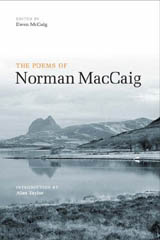 I don’t think so. I’m not good at imitation, and that’s a sort of imitation. If I wrote a play with four characters every single one of them would talk like me regardless of age or sex. And also I’m not good at inventing things. And also I’m not good at inventing things. I couldn’t invent a plot. I couldn’t invent a character. All I write about is what’s happened to me and to people I know, and the better I know them, the more likely they are to be written about. But I couldn’t write monologues in the voice of another person. Wouldn’t want to. I feel it’s intruding on the other person.
I don’t think so. I’m not good at imitation, and that’s a sort of imitation. If I wrote a play with four characters every single one of them would talk like me regardless of age or sex. And also I’m not good at inventing things. And also I’m not good at inventing things. I couldn’t invent a plot. I couldn’t invent a character. All I write about is what’s happened to me and to people I know, and the better I know them, the more likely they are to be written about. But I couldn’t write monologues in the voice of another person. Wouldn’t want to. I feel it’s intruding on the other person.
Do you mind if your poetry is misunderstood?
Anybody who writes doesn’t like to be misunderstood. So I do mind. I ask myself, is it my fault or the reader’s? And if it’s my fault, then I call it a bad poem and I put it in the bucket.
Which books have you read that have unlocked your poetic expression?
Oh dear, I’ve read so much. I said I have no powers of invention. Well, I also have no powers of mimicry. And in a way, that’s been a help to me, because I take great passions for a particular poet – sometimes it lasts for many years, sometimes only for a while. This happens to everybody. But you’d have a job to find many of my poems which would seem to be very influenced by a particular person. In one book, there are one or two poems where a shrewd observer would say, ‘Aha, MacCaig’s been re-reading John Donne.’ And there’s another book where there are a few poems where the same shrewd observer (curse him!) would say, ‘Aha, MacCaig’s been reading that American fellow, Wallace Stevens.’ But aside from that, there’s very little trace of direct influence.
Which friends have you encountered first through their writing?
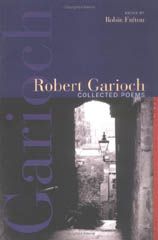 Quite a number. Mostly Scots of course. With people like McDiarmid, Sorley McLean, Sidney Goodsir Smith and Garioch, just to take the first four that naturally come to mind, I knew their writing before I met them.
Quite a number. Mostly Scots of course. With people like McDiarmid, Sorley McLean, Sidney Goodsir Smith and Garioch, just to take the first four that naturally come to mind, I knew their writing before I met them.
Do you feel that reading them led you to become friends with them?
No. I just liked them because they were the person they were.
Moving on now to the books in this room. How do you describe your relationship to the books you own?
Well, I’m a light traveller. I chuck things away. But I hang on to books. I love them. I even think they’re very nice decor in a room – far better than paintings… That’s not quite true!
How does it make you feel when you look at those bookshelves there?
They make me feel friendly. All those authors there, most of whom of course I’ve never met. That’s the poetry side, that’s the prose side, that’s the fishing and miscellaneous behind me. You get an affection for books that you’ve enjoyed. There are some friends you don’t meet for twenty years and when you meet them again it’s as if no twenty years has happened – you’re lucky when that happens. I feel the same about books. There are books up there I haven’t read for many years but I wouldn’t put them out. I never know when I might want to read them again.
How do you arrange your bookshelves?
They’re very strictly arranged because I’m so untidy. If I didn’t arrange them very strictly I’d never be able to find a book. The poems are arranged according to the country they come from for a start – in translation because I’m a hopeless linguist. Czechoslovakian, Swedish, French, Italian, Russian, etc. And they’re all in alphabetical order so that I can find them. I’m orderly in my mind. I hate being trauchled. When I was a teacher, teachers would come into my classroom and admire my desk on which lay nothing whatever, whereas theirs were heaped with papers and books.
Would you call yourself a book collector?
No. I wouldn’t really. I only keep books that I like very much. Otherwise I’d throw them out. I’m not a ‘book collector.’ I don’t care whether a book is a first edition or not. I’m not a bibliophile in that word’s natural sense.
You often read your poetry in public. What’s the difference between a poem heard and a poem read?
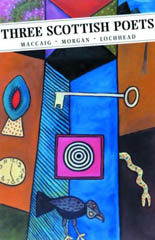 It depends on the reader. Not only have I read a lot in public, I’ve heard a lot of people reading in public. And some poets are far better read off the page because they’re very bad speakers. I’m thinking of one in particular whom I won’t name, a good poet, and he reads in such a dry, boring way, your eyes start drooping. On the other hand, a good reader of his own work – like Robert Garioch – once you’ve heard reading, when you read the poems off the page the rhythms of his voice come in and they definitely help you to understand the poem. Not that his poems are obscure. But it does give an addition if the reader is a good reader. If not, it reduces them.
It depends on the reader. Not only have I read a lot in public, I’ve heard a lot of people reading in public. And some poets are far better read off the page because they’re very bad speakers. I’m thinking of one in particular whom I won’t name, a good poet, and he reads in such a dry, boring way, your eyes start drooping. On the other hand, a good reader of his own work – like Robert Garioch – once you’ve heard reading, when you read the poems off the page the rhythms of his voice come in and they definitely help you to understand the poem. Not that his poems are obscure. But it does give an addition if the reader is a good reader. If not, it reduces them.
I recently came across some old 78s of T.S. Elliot reading the Four Quartets. What do you think of the way he reads his poetry? He has a very dry delivery.
A very dry delivery. But, there is a gossipy interest of course, not only in hearing a poet, but in seeing one. I’m not against gossip. And Elliot’s a good instance. At first I thought, what an awful reader. And then I began to see a connection between the way he read and the way he wrote. And the two combined. Now I don’t think I would like to hear Elliot read by anybody else.
For you, would the ideal library of modern poetry consist of authors reading on compact disc?
I don’t think I would like that. When I talk of hearing a poet’s voice speaking, I always think of it as in the presence of the man. I’ve never bought a cassette of someone reading his own work. I’ve been given some. But if it’s a person I know, like McDiarmid, I’ve got his voice in my head already.
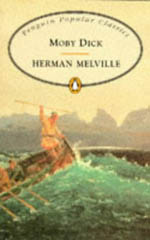 We haven’t touched on the prose works that you enjoy, and that might have influenced you. You once said that when you first read Moby Dick you thought it was a dreadful book, but on re-reading it you thought it was a work of genius.
We haven’t touched on the prose works that you enjoy, and that might have influenced you. You once said that when you first read Moby Dick you thought it was a dreadful book, but on re-reading it you thought it was a work of genius.
That’s happened several times. I find it’s impossible for me to read Proust. And it’s impossible for me to read Henry James. I want to shake him and say, ‘Don’t be so damned finicky!’ Spit it out straight and proper without all these additions and nuances, you know. I just can’t be bothered with them. I love certain novelists and short story writers. I think the novelist I re-read most often is Dickens. I used to have a great love for Dostoyevsky and Tolstoy, the big boys of the last century. But Dickens stays. Every year I go north I take a Dickens with me. He’s so funny for one thing. He’s got his faults. One in particular – he can be shockingly sentimental. Mawkish. But only at times. And what a number of characters he’s created. Everybody knows about Micawber, or Fagin – just as everybody knows about Falstaff and Hamlet. They are grotesques, but they’re alive, very alive. And there are bits in those characters that we know in other people. Oh yes.
The modern style is much more lean and spare than that, isn’t it?
Yes. The nineteenth century novels came from a time when there was no television and people had time to read novels in three volumes. People haven’t got the interest in long long works these days. A lack of interest which I share. I’m sometimes asked, why don’t I write a long poem? And I say, I don’t like reading long poems. Why the hell should I write one?
You also have a large collection of fishing books.
Well, I love fishing. I wouldn’t kill a fly myself but I’ve no hesitation in killing a fish. A lot of men are like that. No bother. Out you come. Thump. And that’s not the only reason. Catching them is a great interest because there are so many things to take into account – the height of the water, the weather, what sort of fly, what size of fly, what colour of fly – and where are the damned fish anyway? Are they under that bank? No, it’s too shallow. You know. It’s full of interest of that sort. But the big one is that it takes you into bonny places. I used to fish the Border rivers, but nowadays you have to queue up for a shot and I can’t stand that. When I go fishing I like to know that there’s nobody within five miles of me. I’m very gregarious, but I love being in the hills on my own. And the country up in west Sutherland and Ross-shire is so beautiful. And I love landscape. Not ‘Lincolnshire,’ you know. No. It’s got to be hills.
What do you think about when you’re there fishing in that landscape?
I don’t go around looking at mountains thinking, ‘There’s a poem in that.’ People often say, where do you get your inspiration? A word I hate. A lot of poets carry a wee notebook in their pockets to jot down ideas and lines and even a verse or two. I never do that. I never think about poetry except when I’m writing it. I mean my poetry. It’s like breathing in and out to me. It’s like having a conversation with someone who isn’t there. Because it has to be addressed to somebody – not a particular person, or very rarely. So I don’t go wandering about the place thinking, ‘There’s a subject for a poem.’ Never ever. I’m too busy looking, or not looking, or talking to somebody. I’m a terrible blether.
Could you mention any poetry that used to be particularly important to you, but perhaps is no longer, and some that is significant to you right now?
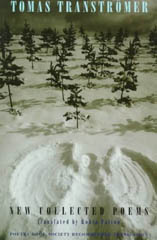 I was very interested in American poetry for many years. Much less now. They’ve gone down in my estimation. In fact a lot of them I think are absolute baloney. Those Charles Olsens and people like that. At first I was interested in seeing what they were up to, what they were doing, why they were doing it. They never moved me in the way that one is moved by true poetry. The first time you read Ginsberg his flamboyance, even his coarseness, is interesting. I’ve still got his books, and I don’t want to throw them out, but I doubt I’ll ever read them again. I love poems by Herbert and Holub – and by the Swedish poet Transtromer, to mention but a few. I don’t mean I read their books right through, but I find myself very often picking one out and reading four or five poems. They stimulate me to write. It’s like priming a pump that’s dry, and you pour water in the top. Squeeze, squeeze, and it squelches away and then the water comes.
I was very interested in American poetry for many years. Much less now. They’ve gone down in my estimation. In fact a lot of them I think are absolute baloney. Those Charles Olsens and people like that. At first I was interested in seeing what they were up to, what they were doing, why they were doing it. They never moved me in the way that one is moved by true poetry. The first time you read Ginsberg his flamboyance, even his coarseness, is interesting. I’ve still got his books, and I don’t want to throw them out, but I doubt I’ll ever read them again. I love poems by Herbert and Holub – and by the Swedish poet Transtromer, to mention but a few. I don’t mean I read their books right through, but I find myself very often picking one out and reading four or five poems. They stimulate me to write. It’s like priming a pump that’s dry, and you pour water in the top. Squeeze, squeeze, and it squelches away and then the water comes.
Jennie Renton 1987

In Question to the Answers… Andrew Philip’s virtual tour! « Our sweet old etcetera… on Wed, 10th Jun 2009 10:15 am
[...] a student of many masters. Doing MacCaig in school broke the idea of free verse open to me. Hopkins and Eliot were early teachers after [...]
jan allatson nee raeburn on Fri, 2nd Jul 2010 12:32 pm
This man taught me at Craiglockhart primary and junior school 1952/53 He really scared me.
Writing Poetry – can it be taught? | ChristineColeman.net on Sat, 4th Dec 2010 9:46 pm
[...] a question that enters my head from time to time, so I was fascinated by his reply to interviewer, Jennie Renton, quoted in full on Frost’s Meditation http://with several more of MacCaigs poems and other [...]
English Teacher on Thu, 29th Mar 2012 8:47 am
Hello Jan
Why did Norman MacCaig scare you? Did he ever recite his poetry to you?
olivier gibbs on Thu, 22nd Aug 2013 9:11 am
This man taught me at Craiglockhart primary and junior school 1952/53 He really scared me.
Lewis MacAskill on Sat, 31st Aug 2013 8:25 am
Norman was a close friend of my Dad (the late Bill MacAskill of Inverkirkaig,Assynt),we saw him a lot as kids when on our summer holidays in Kirkaig.A gentle man with a ready smile,he laughed at my jokes…but I could also tell that he would have “not stood for any nonsense” in the classroom!He also wrote a song for my Dad and his brother George…we have the original hand written and typed up version in a frame at the family home in Kirkaig http://www.tigh-nuilt.co.uk
Thom Fish on Sat, 26th Sep 2015 11:00 am
MacCaig’s free verse, lucid, later poetry is a great treasure that I return to again and again. It’s fascinating to read this interview and ponder his answers.
His work certainly “primes the pump” for me.
Harold Barrique on Tue, 3rd Sep 2024 8:26 am
I remember the days when Channel 4 actually showed poetry recitals on evening television!
I think Norman’s hour-long show was in about 1984/5.